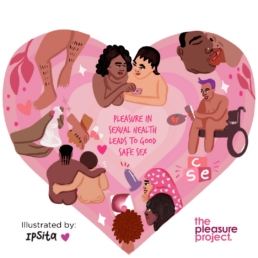What is sex-positivity and why should sex ed be positive?
At The Case for Her, we embrace the concept of sex-positivity: sex should be seen as a positive, healthy and natural aspect of human life and people should be able to “embody, explore and learn about their sexuality and gender without judgment or shame”. A pillar of sex-positivity is that sex should be “good” and all types of sex should be seen as “good” so long as they are pleasurable and consensual for all involved.
A comprehensive and inclusive education about sex and sexuality that centers around safety, desire and joy is fundamental. We know that when education focuses on the positive aspects of sex rather than resorting to scare tactics, we see far better outcomes. It’s actually quite simple: people with a positive view of their sexuality are more likely to engage in safe behaviors.
Empowerment through education makes it easier to communicate openly and make informed choices about one’s body and pleasure. According to sex therapist and licensed psychotherapist, Vanessa Marin, M.S., sex positivity allows one to confidently proclaim, ”This is my body. This is my life. These are my desires. I am an adult and I get to ask myself, as often as I please: ‘What do I want in terms of my sexuality?’” The more comfortable we become with expressing what we want, the more comfortable we become with asserting what we don’t want.
“Sex can be safe – and enjoyable. It’s about having open conversations and giving people confidence. If you ask most people, ‘Did your sex education equip you for your relationships and sex lives?’ they will say, ‘No’.” – Anne Philpott, Founder of The Pleasure Project
Including pleasure in the context of a sex-positive approach to sex ed is key in tackling issues like gender-based violence, sexual assault, reproductive health, family planning and STIs.
What does scientific evidence say?
Pleasure has been identified as a vital component for individual health and wellbeing and as well as in comprehensive sex ed. But its inclusion is infrequent.
To expand the evidence base on the effects of incorporating pleasure in sexual health interventions, The Pleasure Project, together with WHO and supported by The Case for Her conducted a systematic review of previous research. The results are clear. When we talk about pleasure, we can have both better and safer sex through increased condom uptake, better sexual health outcomes and more knowledge on sexual choices.
“We looked at every intervention that tried to have an impact on sexual health from 2005 to 2020. We found 33 that incorporated pleasure out of over 17 000 studies. Those 33 showed us that incorporating pleasure has a significant and positive impact on condom use.” – Anne Philpott, Founder of The Pleasure Project
The vast amount of media coverage received by this evidence is a clear sign of how sought-after it is. Over 45 outlets picked up the story including The Hindustan Times, Slate, The Conversation, top story of BBC Health. For a long time, The Pleasure Project has advocated for why sex ed needs to incorporate pleasure. With these new findings, the community can move on from advocating for why sex ed needs to incorporate pleasure and instead put that evidence to practice.
Putting Pleasure Into Action
At the 25th Congress of the World Association for Sexual Health (WAS) the Declaration on Sexual Pleasure was ratified, reaffirming that pleasure is an important part of the human experience and well-being that should be accessed in the context of sexual rights. Having a policy statement in place with such a strong stance on pleasure was a momentous step in the right direction and laid the foundation for The Pleasure Project’s seven Pleasure Principles.
The Pleasure Principles provide easy and fun guidance on how pleasure-based sex ed can be applied in real life. Anne Philpott explains that, “each principle links back to an action in the declaration but makes it more real, practical giving examples and allows someone who is running sexual education, a teacher, community organization etc. to understand what they can do. Written in a fun way, that’s easy to incorporate.”
What’s Next?
As The Pleasure Principles become adopted and endorsed, people will become more comfortable with the “how-tos” of pleasure-based sex ed. These experiences will inform the next piece of evidence with which we can continue developing the framework to make it increasingly accurate and applicable.
“More and more people, as the evidence happens, as there’s more funding, will say we can do pleasure-based sexual health but we want them to do it in a way that’s high quality and rights-based and with a sex-positive approach.” – Anne Philpott
We have seen considerable investment in innovations both in HIV and family planning programming, yet pleasure remains underfunded. Research has not yet adequately addressed pleasure as a reason for why women use contraceptives, which is striking from a gender perspective, since it neglects the idea that women want to have sex for pleasure and not just procreation.
The Happy Ending
With policy, evidence and practical guidance in place, there is a strong foundation laying the ground for the much-needed work to keep improving people’s sexual health, experiences, relationships and safety. The Case for Her continues to spread this message and we are taking charge as one of the first endorsing organizations of the Pleasure Principles. We are looking forward to seeing our peers join us!

Psst!
P.S. Join us at The Pleasure Project’s webinar at 1:30 PM CET Thursday, March 17 for the launch of The Pleasure Principles and learn how to do pleasure-based sex ed!
-
The Case for Her Teamhttps://thecaseforher.com/blog/author/tcfh-team/
-
The Case for Her Teamhttps://thecaseforher.com/blog/author/tcfh-team/
-
The Case for Her Teamhttps://thecaseforher.com/blog/author/tcfh-team/
-
The Case for Her Teamhttps://thecaseforher.com/blog/author/tcfh-team/



